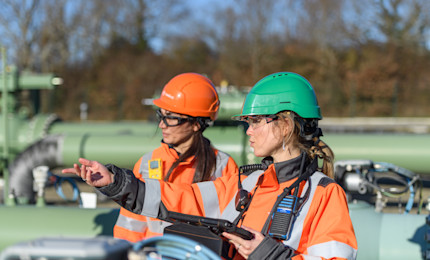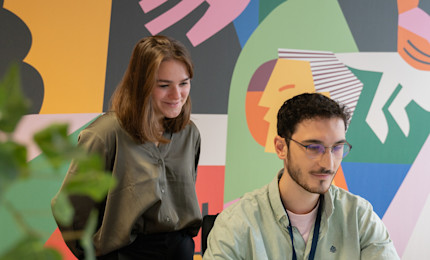Urgence gaz 0 800 028 800

Teréga commits to gender diversity in technical and technological jobs
Convinced of the need to offer the same opportunities for professional development and promotion to each and every individual, Teréga has partnered with the "Elles Bougent" association, which aims to encourage vocations among women for engineering posts in the industrial sectors, and particularly those in energy.
A challenge for society
In 2022, only 26% of engineer and technical executive posts in industry were occupied by women, even though such jobs are at the heart of the energy transition. Today, this growing and flourishing sector remains essentially male. Since 2021, Teréga has committed itself alongside the Elles Bougent association to encouraging women to take their rightful place in these jobs. Teréga’s 11 female Patronesses, or “Marraines”, all of them engineers and technicians, go out to meet female students in schools, colleges and universities, to share their experiences and inspire vocations.
Elles Bougent key figures
Since 2006:
Amélie Marchand
A manager in the worksite operations management department and a Teréga Patroness for the Elles Bougent association
What path has your career followed, and how did you become a Patroness?
Amélie Marchand: After university and initial experience in HSE (Health, Safety and Environment), I am currently a manager in a department that supervises work on Teréga’s infrastructure projects. With a background in science, and as a parent of a student and mother of a young girl, I immediately appreciated the Elles Bougent approach when I discovered it in Teréga in 2022, and I wanted to make a contribution.
What are the objectives of the partnership between
AM: Elles Bougent tries to combat the stereotypes that hold sway in Industry, and to encourage girls and young women to consider scientific and technological careers. Nothing is more helpful in achieving that than direct accounts from women working in companies in those sectors, such as Teréga. As Patronesses, we can assure them that these jobs are accessible for women. The proof: we’re in those jobs now!
How are these encounters organised?
AM: Through its website, the association sets up events to link educational establishments with Patronesses in companies. At the careers event Elles Bougent pour l’orientation for example, establishments say which job forums they’re organising, and Patronesses can sign up to go and speak. We present our career path, covering education and work, our current job, and then we have time for discussion with the students. There are also activities as part of the Digital Week (Semaine du Numerique) or the Industry Week (Semaine de l’Industrie). At these events, it’s the companies that put forward proposals, and educational establishments sign up to take part. In this way, Teréga has already organised meetings with engineers working in digital. As part of the same scheme, I’ve been working for two years now with Coralie Dupeyron, my partner in the HR department for this event, organising what we call our “Elles bougent sur nos chantiers” days. We go out onto worksites, meeting women working in process engineering, industrial safety, and project leadership. I have particular memories of the very first one, in November 2022, when we had really positive feedback from the girls and their teachers. In 2023 we also had the opportunity to organise the day with our service provider, Evolutec Ingénierie, an engineering consultancy firm. Their female engineers talked about their jobs, and we then went to see the projects on which they work taking shape on the ground.
What do you think are the main messages we need to get across to girls and young women?
AM: First of all, I think they need to understand that there is a place for them in industrial companies, that they can find fascinating work there, and at the same time they can flourish as women. They need to see examples of that; they need to be convinced that it’s not just possible, but it’s natural too.
What advice would you give a young woman hesitating about getting into such a career?
AM: Don’t put up barriers for yourself! Girls often ask themselves a lot more questions than boys do when it comes to choosing a career path or applying somewhere. They wonder how they’ll fit in with male teams, how the interactions will work, or how they’ll negotiate a salary. They have even more doubts when it comes to their own capabilities. I remind them they’re not expected to know everything at the end of their studies and that, in any case, these days people change jobs multiple times in their lives, and you’re constantly in training. So I advise them to dare, to push at doors if they want, even if they don’t tick 100% of the boxes for a job! Boys ask fewer questions.
Teréga key figures
À lire aussi

Teréga supports gender equality in the business

Diverse profiles, an incomparable source of energy

CADRE, the responsible governance programme
To successfully carry out its strategy and its desire to build a sustainable business model, the Group sets itself an objective of exemplary conduct in the conduct of its activities and advocates a set of values based on three founding pillars: ethical conduct, reliable organization, robust business management and exemplary purchasing practices. These pillars actively support Teréga’s responsible governance approach and help establish a relationship of trust with all of its stakeholders.





